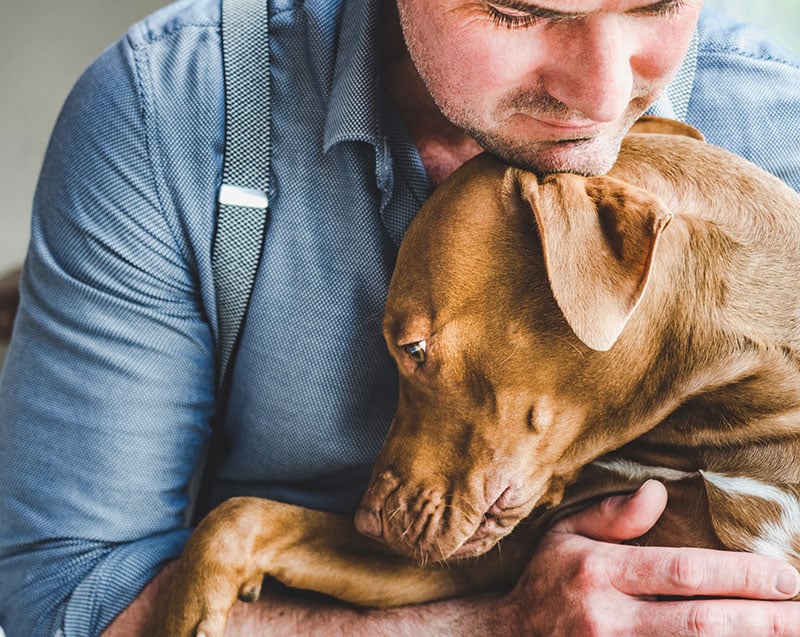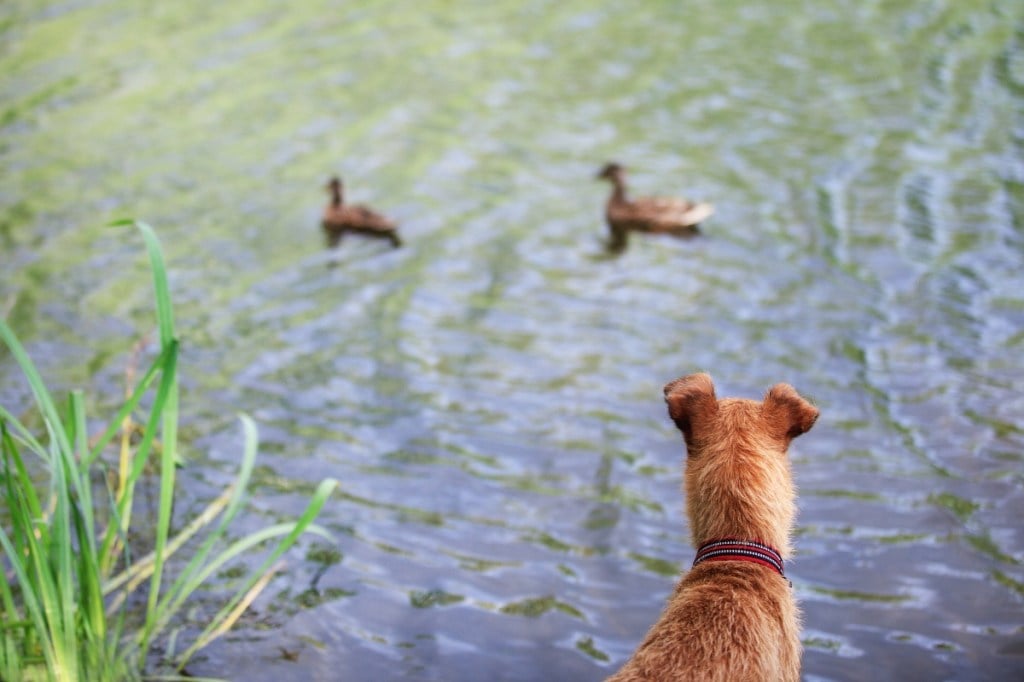Key Takeaways
- Dogs, like people, can feel grief when another pet in the household dies.
- Dogs show they are grieving in many ways and will vary in how long they feel blue.
- Dogs who don’t move on from the loss over time may need the help of a behaviorist or an animal communicator.
Table of Contents
When one of our furry kids passes, it is devastating and heartbreaking for us. Like losing any family member, we feel we have a huge hole left in our lives. Whether it was a sudden death or we had time to prepare, our hearts feel broken for a while as we mourn one of our furry family members.
Do dogs grieve?
Many people wonder how a dog feels when another dog in the home dies. Do dogs experience grief like we do? Yes, they do. Dogs can feel things deeply, just like humans. Their relationship with another dog in the home varies depending on the individual dogs.
Just as we feel closer to some family members than others, our dogs experience different connections with each fur sibling. It’s obvious when they are very bonded. They are usually like ‘two peas in a pod’; often snuggled up on a dog bed, play together, and enjoy each other’s company. If one dog is more aloof and doesn’t seem interested in interacting much with another dog in the home, their bond isn’t usually as strong. But despite how bonded they are, dogs absolutely grieve when another dog dies, and the depth of their sadness varies, depending on how close they were.
How do you know if your dog is grieving?

Just like people, dogs all grieve differently. If your dog appears to be sleeping more than usual or isn’t interested in eating, this could signify they are suffering emotionally. They may be less animated when playing or lose interest quickly in their regular activities. Some people will say that their dog just seems sad. Dogs who tend to be verbal in expressing their emotions and desires may whine or even howl. Your dog may seem unsettled and pace around the house, or you might notice them wandering around, looking in the rooms and places your other dog used to enjoy. You are not imagining things; your dog is looking for them and expecting to see them.
How long does grieving last for dogs?
Again, this answer varies with each dog. Usually, the first few days are the hardest, as the routine usually changes. Maybe they walked together or would enjoy sleeping beside them at night and miss their company.
When you lose a family member, it is quite an adjustment for everyone, including our pets. After a few weeks, most dogs appear to have adjusted to the changes and seem to be happier and more content. However, other closely bonded dogs could feel the loss for weeks to months. They don’t seem to be acting like themselves anymore. We can usually tell a lot about how a dog is feeling by watching their behavior. It is easy to know if your dog is grieving if you know how they usually behave.
Behaviors can change when a dog dies
If the dog who crossed over the rainbow bridge was the matriarch or took on the role of protector and leader, the dogs left behind will feel confused. Sometimes in a home with multiple dogs, people will notice their dogs are barking more when people pass by the house, or their dogs follow them around the house for the first time.
Separation anxiety can often develop or increase, especially when you only have one dog left, as they were accustomed to having company while you were away. If the dog that passed away was more confident and the dog left behind is insecure and gets nervous easily, they can be left feeling even more unsure.
There can be a squabble between dogs in multiple-dog households, which can be very stressful on top of dealing with your own grief. This is because they have lost their leader and are arguing over who is in charge now. Fights typically happen when food is involved, when dogs reunite after being separated, when you return home, when dogs are barking at a threat, or over bones, toys, and space. Dogs can also become possessive over a family member, not allowing another person to hug them, for example, and growling to warn people away.
The key to helping dogs who have difficulty adjusting is learning how to show them that you are their leader in a kind, loving way, to eliminate their stress and confusion over who should be in charge.
How we affect our dog’s grief

Our emotions affect how our dogs feel. Dogs are aware of our energy and feelings — they are absolutely sensing our grief too. Extra sensitive dogs feel things more deeply and are affected more by our emotions. We must honor our need to grieve and process. We can’t pretend that we are fine because our dogs know the truth. We can move through it by processing our own grief and eventually feel more at peace. Some people feel guilty because they know that their sadness is affecting their dogs, but it’s healthier for you to honor your emotions. Once you are feeling more at peace, your dogs will feel that change within you, which will, in turn, help them.
Some dogs need another dog in the home
If you have a dog who loves the company of other dogs and was very close to your dog who died, they may need you to welcome a new dog into your family before they can truly be happy again. It’s essential not to rush into this, though. Some people feel such a void that they bring home a new dog within a few weeks, which is often too soon. It’s important to give all of your family members, furry members included, time to process and grieve before bringing in another dog.
Keep in mind that a new dog will never replace the dog you lost. Remember not to compare your new family member to the dog you are grieving. Often people get upset with a new dog because they are constantly talking about the dog who passed and how their new addition is nothing like them. This isn’t fair to your new family member. Every dog is unique. They have their own quirks, personalities, learning style, and ability to focus, and they don’t automatically know what you expect of them. Be prepared to open your heart fully when welcoming in a new dog so that you can learn who they are, what they may need help with, and how best to help them.
If you have multiple dogs in your home, or a dog in your home only felt comfortable with your dog who passed, it may not be a good idea to bring another dog home right away.
Do I need to seek help for my dog?
You know your dog best. If they are showing signs of grieving, and it has lasted for more than a couple of weeks, it may be worth hiring an animal communicator or dog behaviorist to help. However, if they appear to be bouncing back and acting more like themselves after a few days or a couple of weeks, they are probably adjusting well to the change in your pack dynamics.
Getting help for your grieving dog
Behavioral Training
The key to helping dogs who have difficulty adjusting is learning how to show them that you are their leader in a kind, loving way. This will help eliminate their stress and confusion over who should be in charge. Hiring an expert in dog behavior will let you discover how to help your dog.
Animal Communication
The best way to find out how to help your dog is to ask them, and you can do this by hiring an animal communicator. People who can communicate with animals are referred to by different names — pet psychic, pet communicator, or animal communicator.
Rather than guessing, it is comforting for people to hear directly from their dogs what they need, how they feel, and how to help them. The answers often surprise their families as people don’t expect dogs to be so aware of what is happening. Still, dogs are much more in tune with our lives than we realize and can give specific advice to help us understand them, but often they share things to help their family deal and cope with the loss. As a holistic dog trainer and animal communicator myself, I use my ability to communicate with animals every day in my practice, and it’s a special experience for people to hear messages directly from their dogs.








